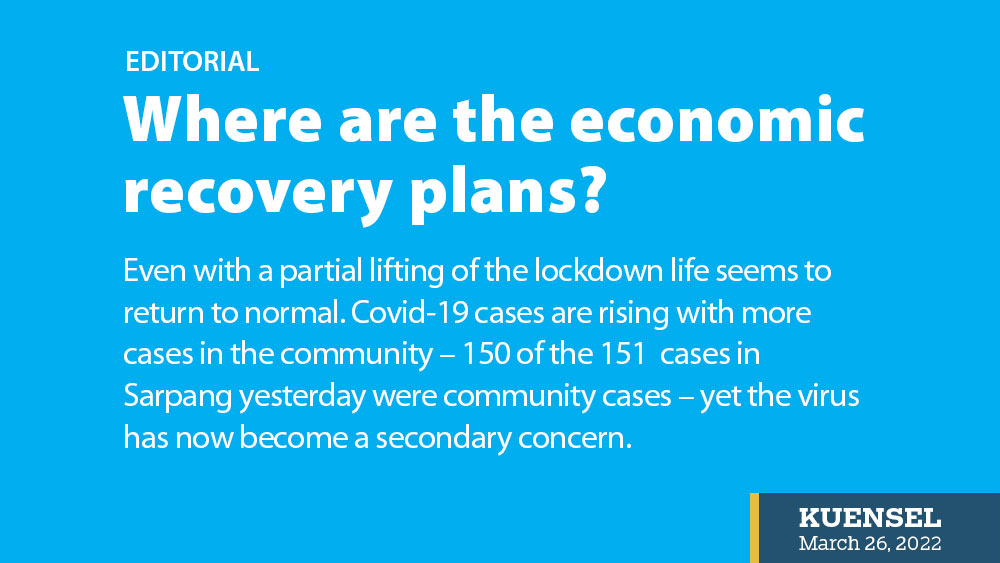Even with a partial lifting of the lockdown life seems to return to normal. Covid-19 cases are rising with more cases in the community – 150 of the 151 cases in Sarpang yesterday were community cases – yet the virus has now become a secondary concern.
The expectation is to return quickly to the routines we were used to before the global Covid-19 pandemic. Knowing that there will be no lockdowns until hospitals are overwhelmed with cases, the focus is on economic recovery. The economy is expected to grow by 5 percent by June, but this is a mere expectation. There are no plans or strategies.
The government had, about two weeks ago, said that they are working on a recovery plan. As of now, no plans are made public. We can surmise that there are a lot of closed-door meetings to discuss a way forward. The only thing that we know is that the private sector is again proposing relief measures from the government to “save them from the shocks of the pandemic.”
Without clear cut economic policies, the private sector will demand packages even with the knowledge that the government is broke. Cash handouts, interest waivers or tax exemptions have already affected the government coffer. Extending it is only reasonable from the political point of view. What we need now, and urgently, is an economic recovery plan. The earlier it is on the table, the better it is.
The government has asked for ideas and feedback as they transit to economic recovery from Covid management. The ideas coming will not be different. The private sector- the so-called engine of economic growth is already hinting at subsidies, relief packages, tax cuts, loan deferments and many more. All this will exert pressure on the government.
With Covid-19 management slowly slipping into the background, the government must return to governing. The economy is battered and the priority should be reviving it. Delaying it could have severe repercussions. We have seen in our regions how some countries got into problems because of debts or imbalance of payments. We might not spiral down the same path, but it is high time we relook into our economic policies.
Borrowing and remittance as of now have cushioned our convertible currency reserves. But both are not sustainable as we have seen in our neighbouring countries. The inflow of hard currencies through foreign direct investment has dried up amid the pandemic. Exports were also affected due to the Covid-19 protocol.
What and where are the plans? What is being planned to revive the tourism industry that brings in the most convertible currency? What about industries? Big and small businesses? What about foreign direct investments? Without discourse on these, many are sarcastically hinting at the government having only one ministry- health.
In the meantime, our debts are piling up. The debt to GDP has increased to 138.8 percent. Given the uncertainties and delays in the construction of mega hydro power projects, we cannot be consoled that it will pay on its own. Even if the Covid-19 pandemic subsides, there are many factors, like the conflict in Europe that can disrupt economies.
But for a few companies that made profit from the pandemic situation and the fiscal and monetary measures, the rest are in neck-deep trouble. There will be a ripple effect on all sectors. Agriculture is an example. With shortages of fertilizers, the yield will be affected making farmers dependent on the import of essentials like rice.


